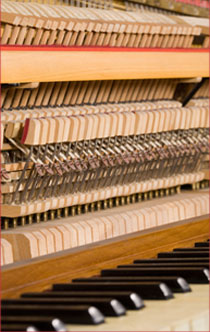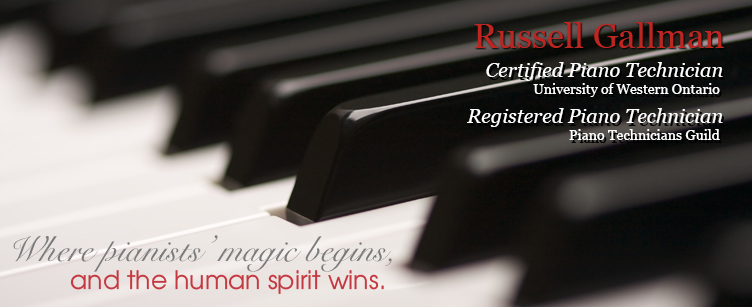Institutional Piano Care
(770) 570-0356
contact@PrimePianoServices.com
Piano Care for Centers of Worship
In today's economic environment that has distressd budgets and donations, piano care is not an item that ranks at the top of everyone's list. In addition, providing piano care information in a way that doesn't present itself as intrusive and hard-sell is also a challenge. Please keep in mind that Russell is first and foremost a piano technician, not a salesman with skill sets to convince you to buy something that you don't need.
Your facility will have pianos that may fit into one of the following categories: (A) Core Painos, (B) Seconday Pianos, (C) Bone Yard Pianos. Your worship center's Core Pianos are those that will require the most frequent attention. For example, pianos typically found in a sanctuary, choir room, and orchestra/band room are at the center of worship and worship preparation. Secondary Pianos are represented by those used say once per week for children's choir activities. And finally, some facilities have pianos that have survived past their prime and are no longer in serviceable condition. Or a piano was donated to the church and came with strings attached - "It was my grandmother's; so, don't give it away." Hence, Bone Yard Pianos are parked in a distant corner and eventually ignored.
Manufacturers recommend that most pianos be tuned 2 to 4 times per year depending upon how they are being used. This is where making a professional observation without sounding "salesman" is tricky. Russell STRONGLY recommends that your church's core pianos be tuned every three months. It is important to keep those instruments as close to concert A440 as possible. First, pianos were designed to sound their best at concert pitch. Variations in pitch are one of the factors that can degrade tone quality. Secondly, when voaclists are rehearsing in a choir room where the instrument has fallen to A437, and then perform in a sanctuary where the pitch is at A442, there will be problems. Vocalists who are stressed at the top of the range at A437 are going to screech at A442. Keep in mind, worship services build mood. Screeching voaclists and teeth-grinding congregants are not the right mix for your worship service. And the third and final plug is for us piano technicians. The longevity of our tunings are often impacted by how we move tuning pins. When we can keep the pitch closer to concert standard, the piano usually behaves in a more stable fashion. However, that too can have variations for later conversations. So to conclude, the rule of thumb for your core pianos: Keep them close to A440.
For your worship center's Secondary Pianos, bi-annual tuning visits are the recommended norm. However, please keep in mind, due to the extreme temperature and humidity fluctuations in the buildings, pianos "jump" out of tune. So listen to your members. If someone says "That piano sounds disgusting", they are probably not joking. Give Russell a call to schedule a tuning.
Helpful tips for institutions:
- When your organization begins to shop for upright pianos, sturdy, good tone, and good feel are key considerations. In some instances, institutional pianos are frequently moved around. Ask your sales representative to show you "institutional" pianos. They have a very rugged design that include grab bars and solid wheels to support a moving piano case. Please avoid considering residential pianos with their Queen Anne style legs or other leg designs that don't have adequate reinforcement. Take pianists with you to get a range of opinion about the sound quality and touch response. Be attentive to the sound quality where the bass break (the heavier wound) strings and the treble break occurs. If the tone sounds "nasal", "twangy", or "tubby" in that zone, it can rarely be improved.
- Building maintenance requires that all carpets be cleaned on occasion. If possible, have your staff move the pianos to a corridor or some location that will not be saturated with humidity. It is not uncommon for fans and dehumidifiers to be set up in order to speed dry carpets after they are cleaned. For example, the large, blue, squirrel cage hurricane fans are often used to provide air circulation in wet areas. Those devices are UNMERCIFUL on piano tunings. If your organization has several upright pianos to move around, look at a product called the Televateur - www.televateur.com. It will not only facilitate the easy relocation of upright pianos, it will minimize the potential costs of worker's compensation claims.
- For pianos that "jump" out of tune and those whose tunings do not give the organization adequate longevity, see the Climate Control tab on this web site. For pianos that are stationary most of the time, have access to electrical outlets, and can be checked by staff to make sure the system is maintained and plugged in, Piano Life Saver systems will be of great assistance in keeping your pianos in tune.
(770) 570-0356
contact@PrimePianoServices.com


